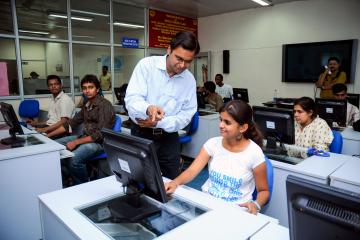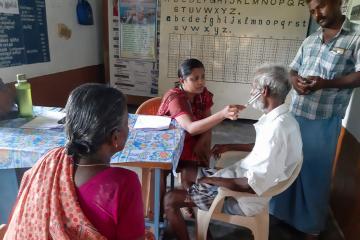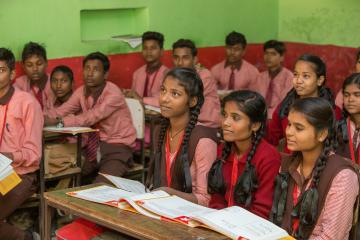
J-PAL South Asia launches ASPIRE with US$6.3 million grant from Veddis Foundation to strengthen the culture of evidence-based policymaking in India

J-PAL South Asia’s efforts to promote policymaking based on scientific evidence and data in India has received a major boost with the launch of the Alliance for Scaling Policy Impact through Research and Evidence (ASPIRE) in partnership with the Veddis Foundation.
ASPIRE will serve as an avenue for organizations that share J-PAL South Asia and Veddis Foundation’s enthusiasm for and commitment to evidence-based policymaking to join forces. It will bring together governments, donors, and nonprofits to solve some of India’s most significant policy challenges through solutions informed by randomized evaluations.
The generous initial grant of US$6.3 million from the Veddis Foundation will enable J-PAL South Asia to expand and deepen its partnerships with state and central governments. J-PAL South Asia will work with its government partners to develop, test, and scale up innovative anti-poverty measures in identified priority areas.
Insights from the most effective solutions will be used to develop new programs as well as to improve existing government programs and policies.
Bringing evidence and data to the fight against poverty
A look at India’s main economic indicators makes a strong case for a program like ASPIRE.
Several estimates indicate that the pandemic has pushed millions of Indians into poverty, a huge setback for the country’s decades of progress in poverty alleviation. Unemployment had been rising even before the pandemic struck, and has remained uncomfortably high ever since.
There is a need for immediate and effective action to support people to rebuild their lives and livelihoods. ASPIRE seeks to make high quality evidence and data available to policymakers to help design effective policies that meet these goals.
ASPIRE is designed to make it easier for governments to respond to their policy priorities by leveraging cutting-edge research insights.
The ASPIRE way: Building on years of experience
Governments, nonprofits, and donors, both in India and elsewhere, are increasingly beginning to recognize the power and value of policies backed by robust data and evidence.
ASPIRE builds on the systematic processes J-PAL South Asia has developed with its government partners over the last 15 years to translate academic research insights into actionable policies.
Under this program, J-PAL South Asia will enter into long-term partnerships with governments, and will work with them to develop anti-poverty programs and policies through a four step-approach:
|
Diagnostic analysis, data use cases, and data capabilities: Undertake field research, stakeholder interactions and analysis of existing government datasets to identify and characterize specific policy challenges faced by government departments and agencies. |
|
|
Design and test innovative solutions collaboratively: Partner with governments and J-PAL collaborators and professors to co-design and pilot test innovative solutions to tackle identified policy challenges. |
|
|
Scale successful innovations and data systems: Facilitate the scale up of effective programs that are backed by strong evidence through collaborations between government departments and partners NGOs, capacity building, and process monitoring activities. |
|
|
Inform policy through evidence: Disseminate evidence from research studies and engage government departments and agencies to continuously forge new pathways to policy change. |
|
ASPIRE draws on one of J-PAL’s greatest strengths: the combination of our global knowledge and local expertise.
J-PAL’s network of the world’s top development economists—our 262 affiliated professors—are at the forefront of producing cutting-edge research on poverty alleviation.
J-PAL affiliates have completed evaluations of approximately 100 policy interventions in India across 11 sectors since 2007. These include a "big push” program to help people move out of extreme poverty, school-based deworming campaigns to improve student attendance, reducing the burden of non-communicable diseases, and changing traditional gender attitudes through greater financial control for women, among others.
Our affiliated professors are supported by large teams of policy specialists and research staff who have deep understanding of the local realities and policy priorities of the regions where they work.
This model has enriched J-PAL’s understanding of the lives of people experiencing poverty, the choices they make, and the misconceptions policymakers may have about them—factors that are vital for making effective policies.
ASPIRE in Odisha
As a first step under ASPIRE, J-PAL South Asia will introduce the Taaron ki Toli program across 23,000 state-run schools in Odisha. An evaluation by Diva Dhar (University of Oxford), Tarun Jain (IIM Ahmedabad) and Seema Jayachandran (Northwestern University), Chair of J-PAL’s Gender sector, found the program to be effective in promoting gender equal attitudes among adolescents in Haryana, a state with one of the worst sex-ratios in India.
Taaron ki Toli (Hindi for Gang of Stars), designed and developed by Indian NGO Breakthrough, uses interactive classroom discussions and homework assignments to reduce gender discrimination over 28 facilitated sessions.
The evaluation found that many students who initially held discriminatory attitudes changed their views because of the program, with some boys showing greater acceptance for women’s education and employment and for men to perform a greater share of household chores.
This builds on a formal partnership between the Government of Odisha and J-PAL South Asia launched in 2019 to improve development outcomes in the state through evidence-informed policies.
As part of ASPIRE, J-PAL South Asia has also been exploring research opportunities in the Government of Odisha’s priority areas for poverty reduction, including livelihoods and labor welfare, education, gender, distress migration, and early childhood development.
J-PAL South Asia will work with the government to examine the biggest policy challenges in these areas and test solutions with randomized evaluations jointly designed by J-PAL-affiliated researchers and the government.
Accelerating a cultural shift
Policies without solid foundations in scientific evidence are at risk of failure and may lead to wastage of time, money and other resources.
J-PAL’s partnership with the Government of Tamil Nadu, which began in 2014 and has continued to grow in scope ever since, illustrates that the process of institutionalizing a culture of evidence-based policymaking can be long and painstaking but ultimately highly rewarding. Today, we are advising at the highest levels of the government.
ASPIRE will formalize and turbocharge this process by building critical capacity to serve a larger number of state governments and central agencies.
A team of 20 research, data and policy experts at J-PAL South Asia are currently working out of several Indian cities as part of ASPIRE. (The team is expanding; see open positions here).
We have set an ambitious goal, and are seeking partners to join us in this effort. Please contact [email protected] to discuss partnership opportunities.
To stay informed about ASPIRE’s work, visit the webpage and sign up for the J-PAL South Asia newsletter to receive updates.
Related Content

Government of Delhi Partners with J-PAL South Asia to Unlock High-Quality Administrative Data for Boosting Social and Economic Growth in India’s Capital

Institutionalizing a culture of evidence-informed policymaking in Tamil Nadu


